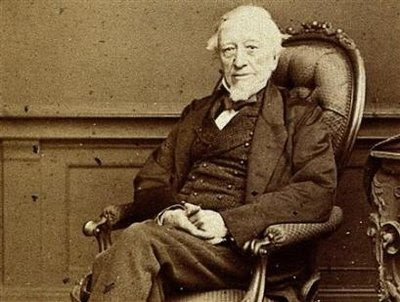Peter Mark Roget is shown in this 1867 photograph from the Wellcome Library in London.
By Arthur Spiegelman
Fri Mar 28, 8:48 AM ET
LOS ANGELES (Reuters) - His mother suffered dark depressions and tried to dominate his life. His sister and daughter had severe mental problems, his father and wife died young and a beloved uncle committed suicide in his arms.
So what did Peter Mark Roget, the creator of Roget's Thesaurus, do to handle all the pain, grief, sorrow, affliction, woe, bitterness, unhappiness and misery in a life that lasted over 90 years?
He made lists.
The 19th century British scientist made lists of words, creating synonyms for all occasions that ultimately helped make life easier for term paper writers, crossword puzzle lovers and anyone looking for the answer to the age-old question: "What's another word for ..."
And according to a new biography, making his lists saved Roget's life and by keeping him from succumbing to the depression and misery of those around him.
"As a boy he stumbled upon a remarkable discovery -- that compiling lists of words could provide solace, no matter what misfortunes may befall him," says Joshua Kendall author of the just published "The Man Who Made Lists" (Putnam, $25.95), a study of Roget's life (1779 to 1869) based on diaries, letters and even an autobiography composed of lists.
Kendall, in a recent interview, said Roget cared more for words than people and that making lists on the scale that he did was obsessive-compulsive behavior that helped him fend off the demons that terrorized his distinguished British family.
Madness was a regular guest in Roget's home, Kendall said. One of his grandmothers either had schizophrenia or severe depression, Roget's mother lapsed into paranoia, often accusing the servants of plotting against her. Both his sister and his daughter suffered depression and mental problems.
Then there was the case of Roget's uncle, British member of Parliament Sir Samuel Romilly, known for his opposition to the slave trade and for his support of civil liberties. He slit his own throat while Roget tried to get the razor out of his hands.
Unlike a Thesaurus, no one understood Uncle Sam's last words: "My dear....I wish..."
Indeed, to quote most of the Thesaurus listing for pain, Roget's was a life filled with grief, pain, suffering, distress, affliction, woe, bitterness, heartache, unhappiness, infelicity and misery.
NOT WHOLLY EVIL
Kendall said, "The lists gave him an alternative world to which to repair." Many writers have declared their debt to Roget, including Peter Pan's creator, J.M. Barrie. In homage, he put a copy of the Thesaurus in Captain Hook's cabin so he could declare: "The man is not wholly evil -- he has a Thesaurus in his cabin.
The 20th century poet Sylvia Plath called herself "Roget's Strumpet" to pay respects for all the word choices he gave her.
But the British journalist Simon Winchester holds Roget responsible for helping to dumb down Western culture because his work allows a writer to look it up rather than think it out.
Roget made his first attempt at a Thesaurus at age 26 but put aside the effort and did not publish his book until 1852 when he was in his 70s and retired. He then kept busy with it for the rest of his life.
It became an instant hit in Britain but did not sell that well when an American edition was published two years later. But when Americans went crazy for crossword puzzles in the 1920s, the Thesaurus assumed its place on reference shelves.
Kendall's book is written in a style that he calls "narrative non-fiction" which contains a lot of dialogue and descriptions of how Roget and his friends feel and think, all, he says, based on source material.
"I did a lot of work to stitch together a narrative," he said, adding that all the scenes in the book are based on actual events.
By Arthur Spiegelman
Fri Mar 28, 8:48 AM ET
LOS ANGELES (Reuters) - His mother suffered dark depressions and tried to dominate his life. His sister and daughter had severe mental problems, his father and wife died young and a beloved uncle committed suicide in his arms.
So what did Peter Mark Roget, the creator of Roget's Thesaurus, do to handle all the pain, grief, sorrow, affliction, woe, bitterness, unhappiness and misery in a life that lasted over 90 years?
He made lists.
The 19th century British scientist made lists of words, creating synonyms for all occasions that ultimately helped make life easier for term paper writers, crossword puzzle lovers and anyone looking for the answer to the age-old question: "What's another word for ..."
And according to a new biography, making his lists saved Roget's life and by keeping him from succumbing to the depression and misery of those around him.
"As a boy he stumbled upon a remarkable discovery -- that compiling lists of words could provide solace, no matter what misfortunes may befall him," says Joshua Kendall author of the just published "The Man Who Made Lists" (Putnam, $25.95), a study of Roget's life (1779 to 1869) based on diaries, letters and even an autobiography composed of lists.
Kendall, in a recent interview, said Roget cared more for words than people and that making lists on the scale that he did was obsessive-compulsive behavior that helped him fend off the demons that terrorized his distinguished British family.
Madness was a regular guest in Roget's home, Kendall said. One of his grandmothers either had schizophrenia or severe depression, Roget's mother lapsed into paranoia, often accusing the servants of plotting against her. Both his sister and his daughter suffered depression and mental problems.
Then there was the case of Roget's uncle, British member of Parliament Sir Samuel Romilly, known for his opposition to the slave trade and for his support of civil liberties. He slit his own throat while Roget tried to get the razor out of his hands.
Unlike a Thesaurus, no one understood Uncle Sam's last words: "My dear....I wish..."
Indeed, to quote most of the Thesaurus listing for pain, Roget's was a life filled with grief, pain, suffering, distress, affliction, woe, bitterness, heartache, unhappiness, infelicity and misery.
NOT WHOLLY EVIL
Kendall said, "The lists gave him an alternative world to which to repair." Many writers have declared their debt to Roget, including Peter Pan's creator, J.M. Barrie. In homage, he put a copy of the Thesaurus in Captain Hook's cabin so he could declare: "The man is not wholly evil -- he has a Thesaurus in his cabin.
The 20th century poet Sylvia Plath called herself "Roget's Strumpet" to pay respects for all the word choices he gave her.
But the British journalist Simon Winchester holds Roget responsible for helping to dumb down Western culture because his work allows a writer to look it up rather than think it out.
Roget made his first attempt at a Thesaurus at age 26 but put aside the effort and did not publish his book until 1852 when he was in his 70s and retired. He then kept busy with it for the rest of his life.
It became an instant hit in Britain but did not sell that well when an American edition was published two years later. But when Americans went crazy for crossword puzzles in the 1920s, the Thesaurus assumed its place on reference shelves.
Kendall's book is written in a style that he calls "narrative non-fiction" which contains a lot of dialogue and descriptions of how Roget and his friends feel and think, all, he says, based on source material.
"I did a lot of work to stitch together a narrative," he said, adding that all the scenes in the book are based on actual events.





No comments:
Post a Comment